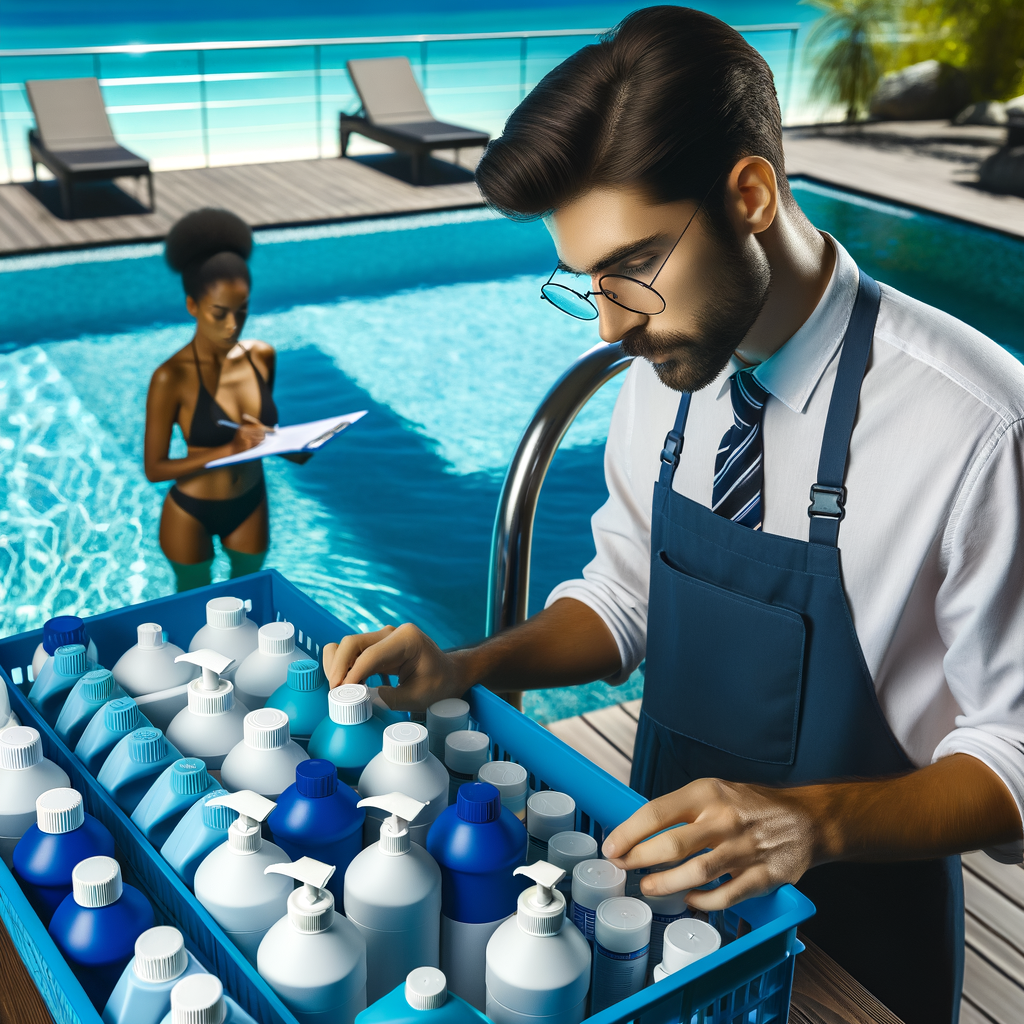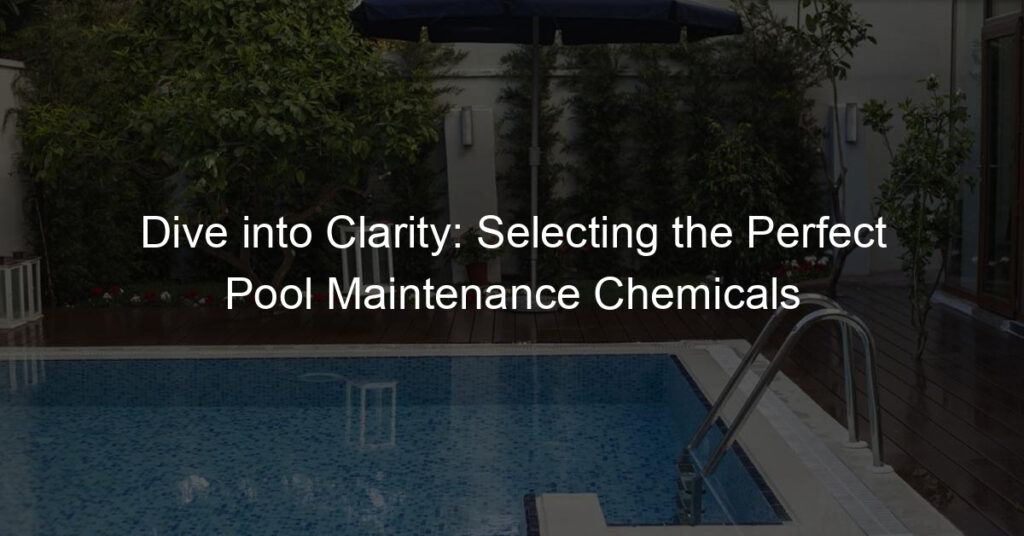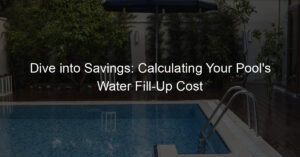
Introduction to Pool Maintenance
Having a swimming pool in your backyard is a great way to cool off during hot summer days. However, to ensure that your pool remains a safe and enjoyable place, it requires regular maintenance. In this section, we will explore the importance of regular swimming pool maintenance and provide an overview of pool cleaning chemicals.
-
- Importance of Regular Swimming Pool Maintenance
Maintaining your pool on a regular basis is crucial for several reasons. Firstly, it helps keep the water clean and safe for swimming. Dirty water can lead to various health issues, such as skin and eye infections. Secondly, regular maintenance can extend the lifespan of your pool and its equipment. Lastly, it can save you money in the long run. Neglected pools often require expensive repairs or replacements.
-
- Overview of Pool Cleaning Chemicals
There are several types of chemicals that are essential for pool maintenance. These include:
-
-
- Chlorine: This is the most common pool cleaning chemical. It kills bacteria and other harmful organisms in the water.
- Algaecide: This chemical prevents the growth of algae in your pool.
- pH balancers: These chemicals help maintain the right pH level in your pool. A balanced pH level ensures that the other chemicals work effectively.
-
It’s important to use these chemicals correctly to ensure the safety and cleanliness of your pool. Always follow the manufacturer’s instructions when using pool cleaning chemicals.
In the following sections, we will delve deeper into the process of choosing the right chemicals for your pool, provide practical pool cleaning tips, and offer a comprehensive guide on swimming pool maintenance. Stay tuned!
Choosing the Right Chemicals for Your Pool
Keeping your pool clean and safe is a top priority for any pool owner. One crucial aspect of this is understanding and choosing the right chemicals for your pool. Let’s delve into this topic.
Understanding Pool Chemicals
Pool chemicals play a significant role in maintaining the cleanliness and safety of your pool. They help keep the water clear, prevent the growth of harmful bacteria, and maintain the right pH level. But what types of chemicals are used in a pool, and what role does each one play? Let’s find out.
-
- Types of pool chemicals
There are several types of pool chemicals, each serving a unique purpose:
-
-
- Chlorine: This is the most common pool chemical. It’s a sanitizer that kills bacteria and other harmful organisms.
- Bromine: Similar to chlorine, bromine is used to kill bacteria. It’s often used in hot tubs and spas because it’s more stable at higher temperatures.
- pH Balancers: These chemicals are used to maintain the right pH level in your pool. A balanced pH level keeps the water safe for swimming.
- Algaecides: These chemicals are used to prevent and kill algae, a common problem in many pools.
- Shock Treatments: These are used to ‘shock’ the pool, or drastically raise the chlorine level for a short period, to kill bacteria and ‘break up’ combined chlorine molecules.
- Role of each chemical in maintaining a sparkling clean pool
-
Each chemical plays a vital role in maintaining a clean and safe pool:
-
- Chlorine and Bromine: They sanitize the pool by killing bacteria and other harmful organisms, making the water safe for swimming.
- pH Balancers: They ensure the water isn’t too acidic or too basic, which can be harmful to swimmers and the pool equipment.
- Algaecides: They prevent the growth of algae, which can make the pool slippery and the water cloudy.
- Shock Treatments: They help to remove bacteria and contaminants, restore chlorine’s effectiveness, and keep the water crystal clear.
Understanding the types of pool chemicals and their roles is the first step in maintaining a clean and safe pool. In the next section, we’ll look at the factors to consider when choosing these chemicals.
Factors to Consider When Choosing Pool Chemicals
When it comes to maintaining the clarity and cleanliness of your pool, the choice of chemicals plays a significant role. However, it’s not a one-size-fits-all approach. There are several factors to consider when selecting the right pool chemicals. Let’s explore these factors in detail.
The size and type of your pool greatly influence the kind of chemicals you’ll need. For instance, larger pools require more chemicals to maintain water balance and cleanliness. Similarly, the type of pool, whether it’s a saltwater pool, chlorinated pool, or a vinyl pool, will determine the specific chemicals needed. For example, vinyl pools may require non-abrasive cleaners to prevent damage to the liner.
-
- Frequency of Use
The frequency of pool use also impacts the choice of chemicals. Pools that are frequently used by many people may require more frequent chemical treatment to maintain water clarity and prevent the growth of harmful bacteria. If your pool is often used, consider using pool chemicals that are gentle on the skin but effective in cleaning.
-
- Local Climate and Weather Conditions
The local climate and weather conditions in your area can affect the choice of pool chemicals. For example, if you live in a hot and sunny area, you may need to add more chlorine to your pool to prevent algae growth. On the other hand, if you live in a cooler climate, you might need less. Additionally, areas with high rainfall might require pool owners to use water balancers more frequently to maintain the right pH levels in the pool water.
In conclusion, the right pool chemicals for your pool depend on various factors. Understanding these factors can help you make an informed decision and maintain a sparkling clean pool. Remember, a well-maintained pool not only looks inviting but also ensures the health and safety of its users.
Pool Cleaning Tips for a Sparkling Clean Pool
Keeping your pool clean is not just about maintaining its sparkling appearance. It’s also about ensuring the health and safety of those who use it. Let’s dive into the importance of regular pool cleaning and how often you should be doing it.
Regular Pool Cleaning
Regular pool cleaning is a crucial part of pool maintenance. It helps to keep your pool looking its best and ensures it’s safe for everyone to enjoy.
-
- Importance of Regular Pool Cleaning
Regular pool cleaning is essential for several reasons. First, it helps to maintain the pool’s clarity and color, ensuring it always looks inviting. Second, it prevents the buildup of harmful bacteria and algae, which can cause health issues for swimmers. Lastly, regular cleaning can extend the lifespan of your pool, saving you money in the long run.
-
- How Often to Clean Your Pool
The frequency of pool cleaning can depend on several factors, including the size of the pool, how often it’s used, and the type of pool. However, as a general rule, you should aim to clean your pool at least once a week. This includes skimming the surface for debris, vacuuming the pool floor, and checking the pool’s chemical balance. If your pool is used heavily or is located near trees or plants, you may need to clean it more frequently.
Remember, a clean pool is a healthy pool. By sticking to a regular cleaning schedule, you can ensure your pool remains a safe and enjoyable place for everyone.
Effective Use of Pool Cleaning Chemicals
Keeping your pool clean and safe is a top priority. One of the most important aspects of pool maintenance is the effective and safe use of pool cleaning chemicals. Let’s delve into this topic and explore some common mistakes to avoid.
- How to use pool cleaning chemicals safely and effectively
Using pool cleaning chemicals is not as daunting as it may seem. Here are some simple steps to follow:
- Read the Instructions: Always read the manufacturer’s instructions on the label before using any pool cleaning chemicals. This will ensure that you use the correct amount and apply it correctly.
- Wear Protective Gear: Always wear gloves and goggles when handling pool chemicals to protect your skin and eyes.
- Store Safely: Store your pool chemicals in a cool, dry place out of reach of children and pets. Never mix different chemicals together as this can cause dangerous reactions.
- Test Regularly: Regularly test your pool’s water to maintain the right chemical balance. This will help keep your pool clean and safe for swimming.
- Common mistakes to avoid
Even with the best intentions, mistakes can happen. Here are some common mistakes to avoid when using pool cleaning chemicals:
- Overuse of Chemicals: Using too much of a chemical can be just as harmful as not using enough. Overuse can lead to skin and eye irritation for swimmers and can damage your pool equipment.
- Ignoring pH Levels: Ignoring your pool’s pH levels can lead to ineffective sanitization. The ideal pH level for a pool is between 7.2 and 7.6.
- Not Testing Regularly: Regular testing is crucial to maintaining the right chemical balance in your pool. Without regular testing, you won’t know if you need to add more chemicals or if the levels are already too high.
In conclusion, using pool cleaning chemicals effectively and safely is crucial for maintaining a clean and safe swimming pool. By following these guidelines and avoiding common mistakes, you can ensure a sparkling clean pool for everyone to enjoy.
Swimming Pool Maintenance: A Comprehensive Guide
Keeping your swimming pool in top-notch condition requires regular maintenance. This comprehensive guide will provide you with the necessary steps to ensure your pool remains clean, safe, and enjoyable.
Regular Maintenance Tasks
Regular maintenance tasks are crucial to maintain the cleanliness and safety of your pool. Here are the three main tasks you should perform regularly:
- Checking and adjusting chemical levelsChemical balance is vital in pool maintenance. It ensures that the water is safe for swimming and prevents the growth of algae and bacteria. You should check the pool’s pH, chlorine, and alkalinity levels at least once a week. The ideal pH level is between 7.2 and 7.8, while the chlorine level should be between 1 and 3 parts per million. If the levels are off, you can adjust them using pool chemicals.
- Cleaning the pool filterThe pool filter plays a significant role in keeping your pool clean. It removes debris and microscopic matter from the water. You should clean the filter every month to ensure it functions optimally. To clean it, remove the filter cartridge and rinse it with a hose. If it’s still dirty, soak it in a filter cleaner and rinse again.
- Skimming debris from the pool surfaceSkimming is a simple yet essential task in pool maintenance. It involves removing leaves, bugs, and other debris from the pool’s surface using a skimmer net. This should be done daily to prevent the debris from sinking to the bottom of the pool, where it becomes harder to remove.
By performing these regular maintenance tasks, you can ensure your pool remains clean and safe for everyone to enjoy. Remember, a well-maintained pool is not only more enjoyable but also lasts longer, saving you money in the long run.
Seasonal Pool Maintenance
Just like your home, your swimming pool also needs seasonal maintenance. This involves preparing your pool for the summer season and winterizing it when the cold season sets in. Let’s delve into these two crucial aspects of pool maintenance.
-
- Preparing your pool for the summer season
As the summer season approaches, it’s time to get your pool ready for the fun and relaxation that comes with the warm weather. Here’s a simple guide to help you prepare your pool for the summer:
-
-
- Remove the pool cover: Start by removing and cleaning the pool cover. This prevents any debris on the cover from getting into the pool.
- Check the water level: After removing the cover, check the water level. If it’s low, add more water until it reaches the appropriate level.
- Test the water: Use a pool testing kit to check the pH, chlorine, and alkalinity levels of the water. Adjust these levels as necessary to ensure the water is safe for swimming.
- Clean the pool: Skim off any leaves or other debris from the surface of the water. Also, brush the sides and bottom of the pool to remove any algae or dirt.
- Run the filter: Finally, turn on the pool filter and let it run for at least 24 hours before you start using the pool.
- Winterizing your pool
-
When the swimming season is over, it’s time to winterize your pool. This involves protecting it from the harsh winter conditions to prevent damage. Here’s how to winterize your pool:
-
- Balance the water chemistry: Just like when preparing for the summer, you need to test and adjust the water chemistry. This helps prevent scale buildup and corrosion during winter.
- Lower the water level: Drain some water from the pool to prevent it from freezing and causing damage to the pool structure.
- Clean the pool: Remove any debris from the pool and clean it thoroughly.
- Add a winterizing chemical kit: These chemicals will help keep the water clear and free from algae during the winter months.
- Cover the pool: Finally, cover the pool to keep out leaves, snow, and other debris.
In conclusion, seasonal pool maintenance is crucial in preserving the longevity and functionality of your pool. By preparing your pool for the summer and winterizing it properly, you can enjoy a clean, safe, and fun swimming experience all year round.
Case Study: Achieving a Sparkling Clean Pool with the Right Chemical Selection
-
- Background of the case study
Our case study focuses on John, a homeowner who loves his backyard pool. However, he struggled with keeping it clean and sparkling. Despite his best efforts, the pool water often appeared murky and uninviting. John was using a popular brand of pool chemicals but wasn’t seeing the results he desired.
-
- Challenges faced in maintaining a clean pool
John faced several challenges in maintaining his pool. The water often had an unpleasant odor, and there was a persistent problem with algae growth. Despite regular cleaning, the pool water was not clear and sparkling as he wanted. He also noticed that his pool’s pH levels were often unbalanced, which could lead to skin irritation for swimmers.
-
- How the right chemical selection led to a sparkling clean pool
John decided to switch to a different brand of pool chemicals, specifically designed to tackle the issues he was facing. The new chemicals included an effective algaecide, a pH balancer, and a clarifier to make the water sparkle. After a few weeks of using the new chemicals, John noticed a significant improvement. His pool water was clear, the unpleasant odor was gone, and the pH levels were balanced.
-
- Key takeaways from the case study
This case study highlights the importance of choosing the right chemicals for pool maintenance. Not all pool chemicals are created equal, and it’s crucial to select products that address your specific pool challenges. In John’s case, switching to a different brand of chemicals made all the difference in achieving a sparkling clean pool.
Conclusion: Maintaining Your Pool’s Clarity
As we reach the end of our comprehensive guide, let’s take a moment to recap the key points and share some final tips to ensure your pool remains sparkling clean and inviting.
-
- Recap of pool maintenance and chemical selection
Maintaining your pool’s clarity is a combination of regular cleaning and careful chemical selection. Remember, the right balance of chemicals is crucial to keep your pool clean and safe. Chlorine is used to kill bacteria and algae, while pH adjusters help maintain the right acidity level. Algaecides prevent algae growth, and shock treatments are used to restore water clarity after heavy use or a rainstorm. Always use chemicals as directed and store them safely away from children and pets.
-
- Final tips for maintaining a sparkling clean pool
Consistency is key when it comes to pool maintenance. Regular skimming, vacuuming, and brushing will keep debris and algae at bay. Monitor your pool’s chemical levels at least once a week, and more frequently during heavy use or after a storm. Don’t forget to clean your pool filter regularly and replace it as needed. Lastly, always keep an eye on the water level and adjust it as necessary.
In conclusion, maintaining your pool’s clarity is not a one-time task but a continuous process. With the right knowledge, tools, and commitment, you can enjoy a sparkling clean pool all season long. Remember, a clean pool is not just visually appealing, but it’s also safer and more enjoyable for everyone. Happy swimming!














